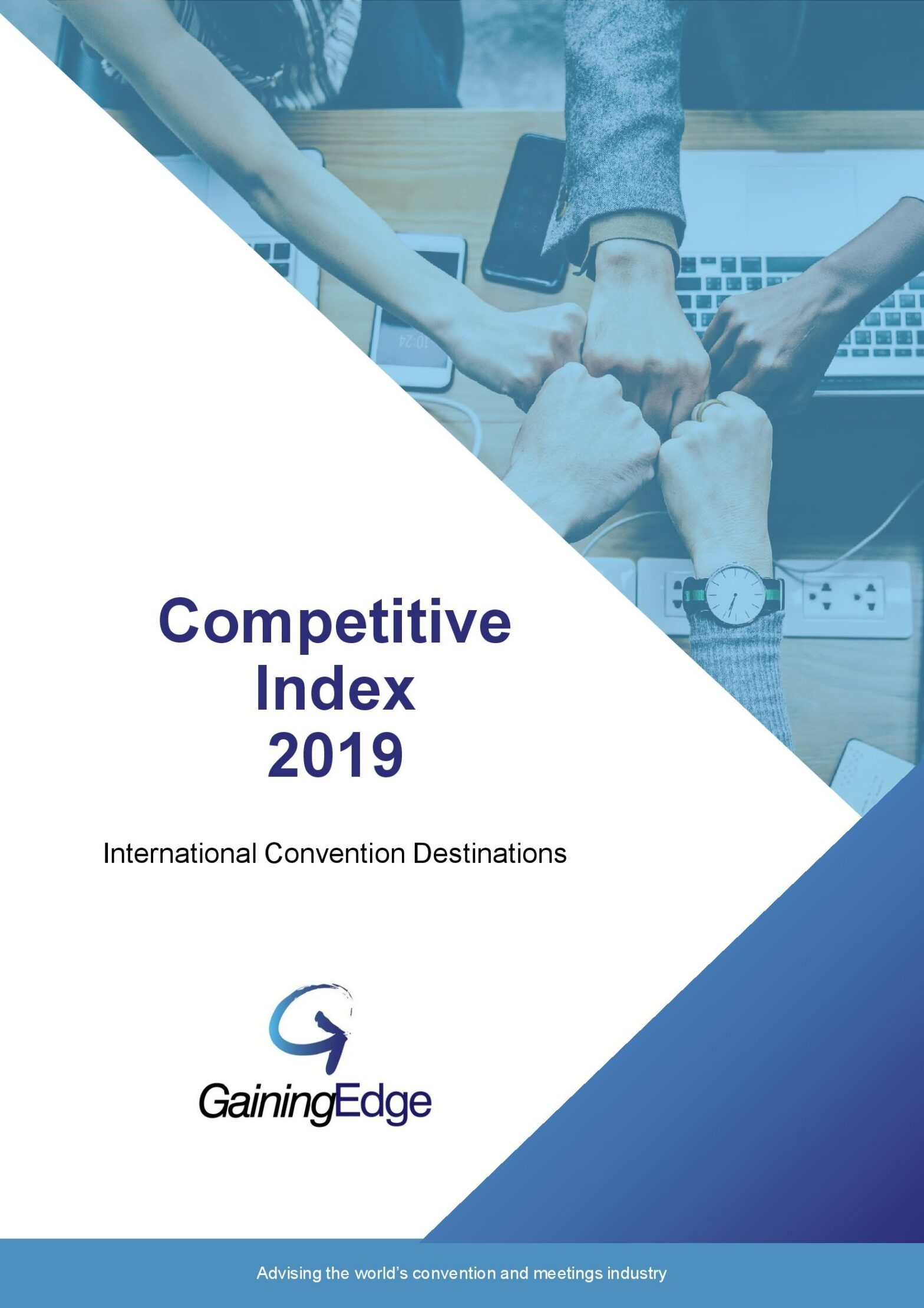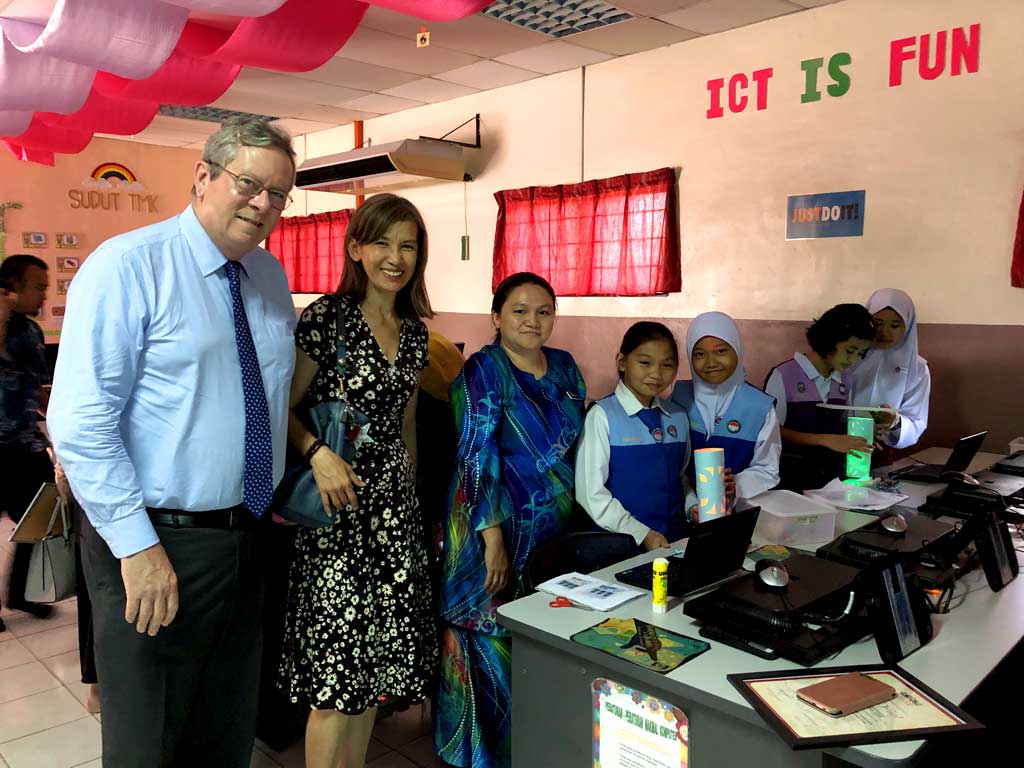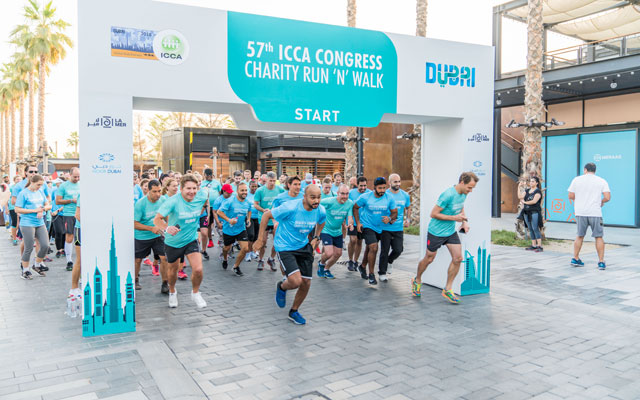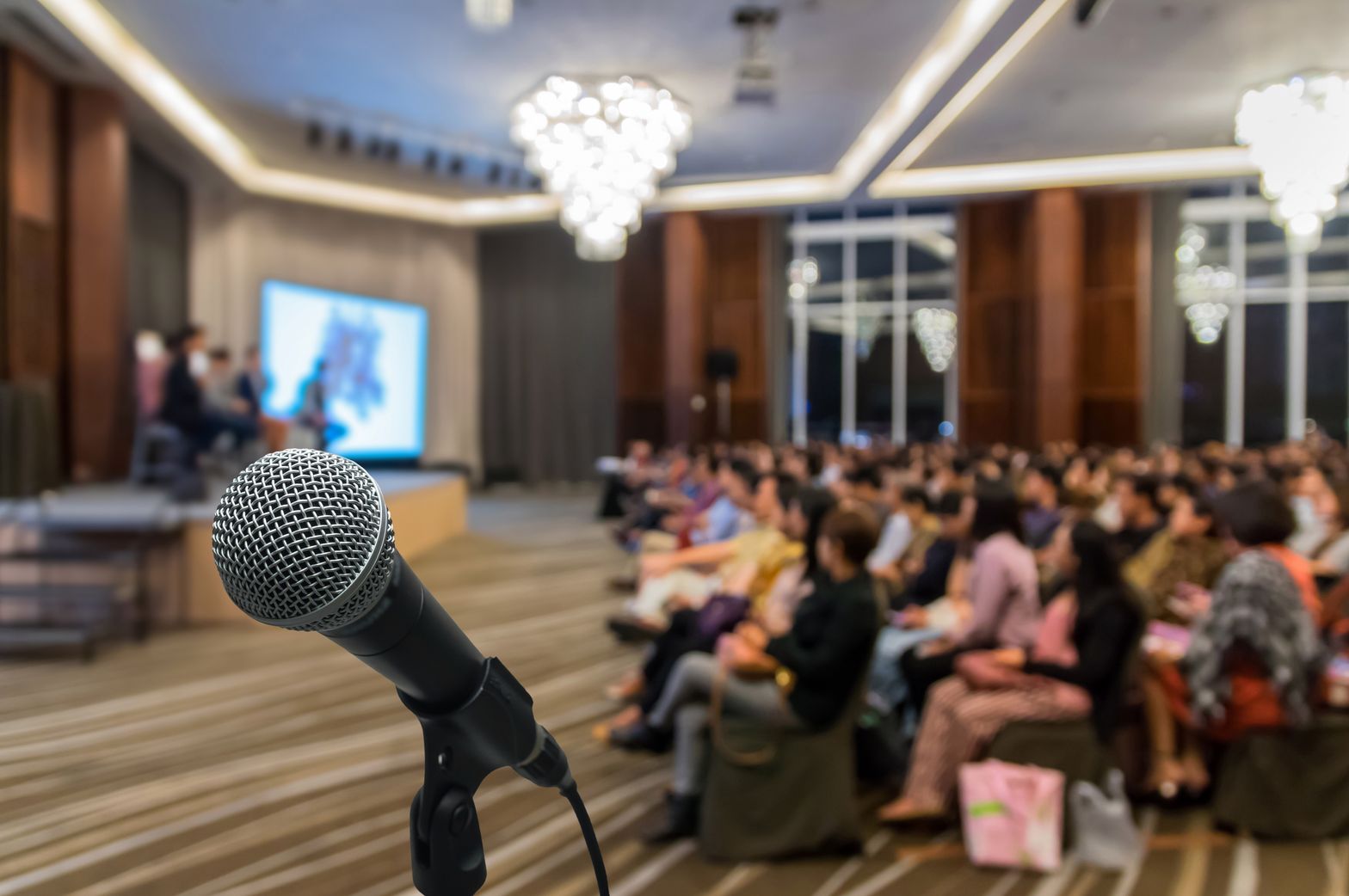PRESS RELEASE Global convention industry consulting firm, GainingEdge, has released its second annual Competitive Index of international convention destinations. The 2019 edition extends the listing to the world’s top 103 cities – those which have hosted 82 or more international conventions over the past three years as reported by the International Congress & Convention Association… Continue reading 2019 Competitive Index Offers Free Tool for Destination Benchmarking
Author: 3lane
Perspectives: Association Meetings Can Greatly Benefit Local Communities
Source: CEI, posted 3 May 2019
Association meetings have the ability to exchange knowledge not just among delegates, but also among local communities. According to Jane Vong, senior manager, Asia, for meetings industry advisors GainingEdge, groups travelling to a destination for association meetings should make use of their skills and knowledge by passing them down to local communities.
For instance, if thousands of experts have flown into a destination for a large cybersecurity event, they could go into schools to educate kids on being safe on the internet. These work especially well with meetings where objectives and goals are clear, and often point towards raising awareness within an industry.
“There’s a lot of opportunity for the local host to leverage groups while they’re there. These are the golden opportunities that are lost – and if you can do that, you enhance the impact even greater,” said Vong.
“It doesn’t cost a lot of effort or money. And it gives a big impact on the kids who receive this knowledge. These kind of programmes improve the organisation’s PR image, and they can use it as a management tool to inspire their staff.”
Vong cites another example of when GainingEdge conducted research around a Rehabilitation International congress in Edinburgh to promote disability issues. “The congress went to Edinburgh and the vision of this congress was to spread awareness about universal access. The local host wanted to make sure that by hosting this congress, it wasn’t just about the economic impact but it can also be a catalyst for change in the city,” said Vong.
In the lead-up to the event, the local hosts managed to introduce an accessibility audit for the city and learned about best practices around disability tourism. As a result of that, “the congress was successful, and everybody was happy”, according to Vong.
“The city became more ready to welcome people with disabilities. And at the same time, they discovered the potential of accessible tourism. For them, it wasn’t just about inclusivity, it was also a business opportunity,” she said.
Another benefit of meetings in a local city is the ability to reach out to local communities who may not be able to afford to fly out for international congresses. “If a conference goes to New York, for instance, how many people have the opportunity to go to New York? If a conference comes to a local city, the community can gain knowledge and professional development when the event comes,” said Vong.
“The second thing is when the conference comes to the city, the locals have the opportunity to showcase their expertise. They can be speakers, they can be moderators, they can be facilitators. Give them a chance to be on an international platform with their peers and show off what thay have. And that’s the power of conferences.”
Events don’t just have the benefit of thousands of experts flying into a city at once, it also has the unique ability to impact local communities long after the event has finished.
“After the group has left, there’s plenty you can do to leverage the fact that they came. How can you optimise it post-event? I don’t think there’s enough thought put into it,” said Vong.
“Using the Edinburgh example, after the event is done, they started a tourism action group to produce brochures about how to make the city more accessibly, and they used input from the experts who came. After the event, the legacy lives on.”
One challenge associations or local hosts may face is the lack of local knowledge or resources to customise programmes for local communities. To combat that, Vong says these should ideally be arranged pre-event with the local DMC or bureau, who will be able to direct associations to communities they can help.
Association meetings have the ability to exchange knowledge not just among delegates, but also among local communities. According to Jane Vong, senior manager, Asia, for meetings industry advisors GainingEdge, groups travelling to a destination for association meetings should make use of their skills and knowledge by passing them down to local communities.
Read more at: https://www.campaignasia.com/article/association-meetings-can-greatly-benefit-local-communities-gainingedge/451439
Walking the Talk: The ICT CSR Legacies of Sarawak CB
Source: The Iceberg, posted on 24 April 2019
School computer labs across rural Sarawak, Malaysia, will be benefitting after convention organisers and their delegates complete surveys from the Sarawak Convention Bureau. Sarawak CB will be making a donation for each returned form to the Chumbaka Junior Innovate Fund.
Many of the world’s corporate citizens and organisations incorporate an element of Corporate Social Responsibility (CSR) into their event programmes as their giving-back to society. Besides building a positive business reputation, better brand recognition (and increased sales), such programmes also help enhance their team members’ loyalty while cementing interpersonal bonds.
In my last story, I shared how two organisations – the International Congress and Convention Association (ICCA) and the Tourism Promotion Board Philippines – used meetings and conventions as their conduit to CSR. I was recently delighted to be part of similar efforts closer to home.
The Sarawak Convention Bureau (Sarawak CB, also known as Business Events Sarawak) has hit on an effective and meaningful way to build CSR into ten national and international conventions that will take place in the Malaysian state this year. As part of a research project which covers these ten conventions, the participants, local host committees and also the HQ organisations (where applicable) will be surveyed.
For every completed questionnaire, Sarawak CB will donate $1.00 to the Chumbaka Junior Innovate Fund. This Fund is a home-grown effort targeted at rural schools in Sarawak with the goal of introducing these students to the world of digital technology. It is hoped that by the end of the campaign, enough funds would have been raised to purchase some 70 digital learning kits for these schools.
The Chairman of Sarawak CB, Tan Sri Dato Sri Dr Muhammad Leo Toyad Abdullah said: “We want to emphasize the importance of business events as the driver that accelerates change in Sarawak. Our latest initiative will power the children of today, for tomorrow.”
Echoing his sentiments, Sarawak’s Minister of Education, Science and Technological Research Dato Sri Michael Manyin Jawong, who was also present at the Launch of the Chumbaka Innovate Fund in a school just outside Kuching, reiterated that his Ministry will continue to actively pursue the impacts from this legacy so that Sarawak can be a role model leader in education and research.
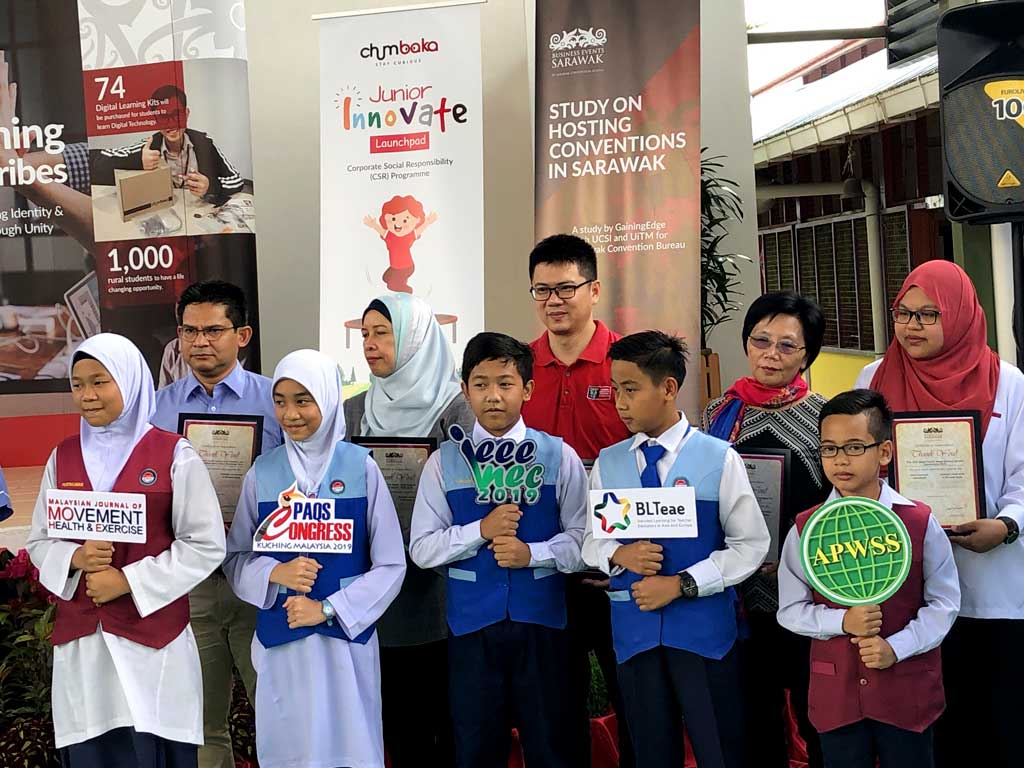
Photo: Local hosts of the conventions with students during the Chumbaka Junior Innovate Fund launch.
The ten selected conventions for this CSR project are 8th International Conference on Bioprocessing; Conference on Inclusive Early Childhood Education; 1st World Chinese Medicine Forum; 24th International Kodaly International Symposium; 3rd MSHA International Spinal Health Congress; 6th Movement, Health and Exercise Conference and 12th International Sports Science Conference; Congress of the Pacific Association of Quantity Surveyors; IEEE Nanoelectronics Conference; 1st International Conference on Education in the Digital Ecosystem; and the 27th Asian-Pacific Weed Science Society Conference.
Sarawak CB is no stranger to investing time and effort on legacy outcomes – when the bureau played host to the 2016 ICCA Annual Congress in Kuching, a CSR project linked to the state’s endangered primate – the orangutan or Man of the Forest – kicked off with their pre-event marketing. Additionally, when ICCA Congress participants converged in Kuching, they were encouraged to bring one or two English language books with them for the Book Share Programme, an initiative of the Librarians Association of Malaysia – Sarawak Chapter. These books, donated by ICCA members from around the world, eventually made their way to libraries and community halls in rural Sarawak.
It is indeed heartening that the state has put such focus on its future generation. Be it mastering the English language or developing life skills in this age of digital technology, the government of Sarawak – through Sarawak CB – has skillfully used meetings and conventions to leave a legacy for its local communities. As they say in the Malay language in Sarawak, “terima kasih” – “thank you” – to all convention participants and host organisations who are helping in this endeavor.
Jane Vong Holmes, Senior Manager Asia, GainingEdge

Jane Vong Holmes is senior manager – Asia of GainingEdge, a consultancy specialising in the business events industry. She has co-authored two UNWTO publications on the Asian meetings industry and various destination market studies. She is an ardent advocate for giving back to communities through conventions and events. Most recently, she recently released a joint-report on universal accessibility in the meetings industry.
Many of the world’s corporate citizens and organisations incorporate an element of Corporate Social Responsibility (CSR) into their event programmes as their giving-back to society. Besides building a positive business reputation, better brand recognition (and increased sales), such programmes also help enhance their team members’ loyalty while cementing interpersonal bonds.
Perspectives: You Can Make a Difference Too
Source: TTG Asia, posted 9 January 2019
Businesses and associations are increasingly incorporating a corporate social responsibility (CSR) element in their meetings and events programmes.
One of my favourite examples is by the International Congress and Convention Association (ICCA), which has for years substituted speakers’ gifts at its annual congress and General Assembly with a financial donation to a charitable organisation selected by the Local Host Committee.
At its last two congresses in Prague and Dubai, a Fun Walk N Run was also organised for delegates who wanted to explore the city in a quick and fun way while taking the opportunity to offer a small financial donation to a local NGO. It was a great way to connect with other like-minded ICCA delegates and to start the day on an energetic note.
It is amazing how fast friendships can form this way.
Simultaneously, a grassroots project, ICCA Members Gift of Love (ICCA Members GOL), encourages delegates to bring a small gift with them to the congress. Since 2013, ICCA delegates have contributed wheelchairs, books, puzzles, children’s shoes, toys and spectacle frames to various NGOs around the world.
Past ICCA Members GOL partners include Local Host Committees and their selected charities – the Shanghai International Communication Center for The Disabled, China (2013); Losev Foundation for Children with Leukemia, Turkey (2014); Haciendo Camino, Argentina (2015); Malaysian Librarians Association Sarawak Chapter, Malaysia (2016); SOS Children’s Village, Czech Republic (2017); and Noor Dubai Foundation, the UAE (2018).
While everyone enjoys receiving gifts, even more people enjoy giving. I have seen how enthusiastically and carefully my fellow ICCA delegates have selected their gifts. Co-workers, mothers and neighbours have been recruited to expand the gift collection network as much as last-minute purchases at airports; with some even lovingly packed with a gift card and the warmest wishes.
Recently I participated in MICECON 2018, organised by the Tourism Promotions Board Philippines (TPB) in the city of Bacolod. Participants at this biennial national conference on business events – the sixth edition in 2018 – were encouraged to bring with them a small essential item in their suitcase. It could be a towel, blanket, children’s book or notebook with pen. These items were for the Holy Infant Nursery Foundation and the Bacolod Girls’ Home Foundation.
In addition, TPB worked with city officials – mayor Evelio “Bing” Leonardia and his team – and two food manufacturers which produce Bacolod’s famous delicacy, piaya (an unleavened flatbread). Tapping into the Philippines’ pasalubong culture or the practice of bringing home a food gift, the two food manufacturers Merczi and BongBong’s offered a percentage of their sales to the above-mentioned charities when any MICECON delegate produced his/her badge during purchase.
This was done not only at the factory outlets which were part of the pre-conference tour, but also at selected outlets around the city.
I was struck by the simple ingenuity of the organiser and its partners, and had no doubt that the two charities enjoyed a small boost in funding with the help of MICECON delegates who brought back their pasalubong to their families and work colleagues.
We do not need to try to save the whole world. If our conscious actions as an events organiser or a delegate can make a difference to just one individual, this is as good a start as any.
As part of the business events industry, we are a privileged community. Our work includes travel to exotic locations for learning, networking and business or partnership opportunities, and where the host communities welcome us so warmly and with such great hospitality. Doing good and giving back to the locals are just small ways of saying thank you and paying it forward.
We can make a difference.

Jane Vong Holmes is senior manager – Asia of GainingEdge, a consultancy specialising in the business events industry. She has co-authored two UNWTO publications on the Asian meetings industry and various destination market studies. She is an ardent advocate for giving back to communities through conventions and events. Most recently, she recently released a joint-report on universal accessibility in the meetings industry.
More association and business events are setting good CSR examples by weaving opportunities for their delegates to do good, observes Jane Vong Holmes
GainingEdge Launches New Global Competitive Index
PRESS RELEASE A new index which ranks cities in terms of their competitive strength for attracting international conventions was launched at the ICCA Annual Congress this week in Dubai. GainingEdge CEO, Gary Grimmer said that the index will help destinations gain insights into how much convention business they should expect to host on an annual… Continue reading GainingEdge Launches New Global Competitive Index
A Retrospective Look: IAS 2013 Kuala Lumpur
Jane Vong Holmes, GainingEdge’s Senior Manager – Asia, looks back on the IAS Conference on HIV Pathogenesis, Treatment and Prevention which took place in Kuala Lumpur, Malaysia in 2013. In her feature article for the Iceberg, she outlines the positive impacts of being part of this International Aids Society Conference, on the participants and host country four years on.
Jane Vong Holmes, GainingEdge’s Senior Manager – Asia, looks back on the IAS Conference on HIV Pathogenesis, Treatment and Prevention which took place in Kuala Lumpur, Malaysia in 2013.
Designing your Destination’s Future
PRESS RELEASE
11 July 2017, Vancouver
Designing your Destination’s Future
With thousands of destinations pursuing the social and economic benefits of tourism, a powerful new axiom is emerging. “Sustainable and enduring tourism and conventions no longer happen solely by great marketing and geographic good fortune. They must be designed with a broad perspective focused on the entire visitor experience in the destination,” said Paul Vallee, Executive Consultant-Americas of GainingEdge.
“While a marketing plan is focused on ways to communicate with customers, a master plan is concerned about developing exceptional experiences when your customer is in your destination. Master plans focus on such things as infrastructure and product”.
Vallee went on to emphasize that to do this successfully, it will require the strategic alignment and ongoing engagement among industry, community, and marketplace stakeholders for the destination brand and experience to flourish. Vallee has extensive experience managing complex organisations, strategic planning with diverse stakeholders and destination master planning. GainingEdge has worked on several projects with InterVistas Consulting (IVC) which served as project lead on Destination Master Plans for Birmingham (USA), and Denver (USA). Vallee who is based in Vancouver, Canada will soon begin a similar project, again collaborating with IVC, in Fort Worth, Texas.
“Visionary destinations are quick to realise that they need a long-term direction for its tourism and business events sector, a shared path for stakeholders to follow on for the next 10 years and beyond,” agreed Gary Grimmer, CEO of GainingEdge. “One of our first related projects was Rethink Vancouver where Paul, at that time, was our Tourism Vancouver client. In that project, GainingEdge worked with Tourism Vancouver on a high level framework that culminated in a comprehensive Tourism Master Plan for Vancouver.” Since then, among others, GainingEdge has been part of Madison, Wisconsin’s (USA) planning efforts.
You can read more and gain insights into Destination Master Planning here. – ends
Media enquiries:
Gary Grimmer, +61 419 561 635 (Australia)
Paul Vallee, +1 604 368 3220 (Canada)

Paul ValleeWith thousands of destinations pursuing the social and economic benefits of tourism, a powerful new axiom is emerging. “Sustainable and enduring tourism and conventions no longer happen solely by great marketing and geographic good fortune. They must be designed with a broad perspective focused on the entire visitor experience in the destination,”
360 Support is Paramount
PRESS RELEASE
9 May 2017, Melbourne
“360 Support is Paramount”
The biggest setback for any destination to create a sustainable business events industry is the lack of community-wide support.
Mike Williams, Senior Partner of GainingEdge believes that support required is not only from the business events industry, but also from all levels of government, the academic community, local business leaders and the general public.
To secure long term government support, a bureau must align its strategies with that of government priorities and demonstrate the relevance of business events for governments to achieve their economic growth objectives. On the other hand, meetings industry partnerships can help a destination extend its brand value proposition to the marketplace, create value-add programmes to entice new business and develop new products and services suitable for the business events sector.
Williams pointed out that best practice bureaus are embarking on association development programmes that strengthen their local host communities and make them better resourced to host international conferences. As academic institutions are the main source of the future workforce, working closely with relevant institutions to help develop curriculum and providing industry internships for students is another form of community engagement that is critical for the development of a sustainable meetings industry. Last but not least, CSR programmes are an effective way of generating community benefits and raising awareness of the importance of business events to the destination and to the host community.
GainingEdge will host its annual GainingLeads and GainingEdge Knowledge Exchange (GEKEX) sessions during IMEX 2017. In addition, GainingEdge CEO Gary Grimmer will moderate at ICCA’s (International Congress and Convention Association) Association Expert Seminar, the 13th edition, since this popular seminar which brings together association executives and ICCA members together first began in 2005.
Read more about the relationship between community support and a sustainable meetings industry in the May 2017 issue of GainingInsights.
Media enquiries:
Gary Grimmer (gary@gainingedge.com)
Mike Williams (mike@gainingedge.com)The biggest setback for any destination to create a sustainable business events industry is the lack of community-wide support.
Mike Williams, Senior Partner of GainingEdge believes that support required is not only from the business events industry, but also from all levels of government, the academic community, local business leaders and the general public.
Why It’s Important to Tell the Story
Source: The Iceberg Borneo’s orangutans are among the beneficiaries of two corporate social responsibility programmes that were part of the recent ICCA Congress in Kuching, Sarawak. Now the wider outcomes the event delivered will be part of a new study measuring its impact. By Jane Vong Holmes, ICCA Asia Pacific Chapter Deputy Chair and Senior Manager Asia, GainingEdge In many parts of Asia,… Continue reading Why It’s Important to Tell the Story
